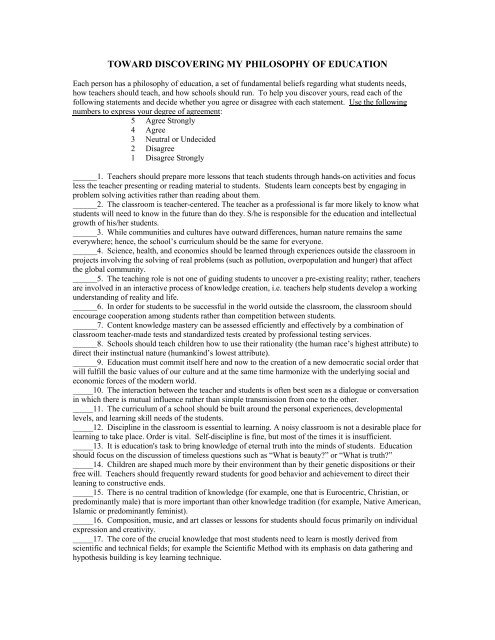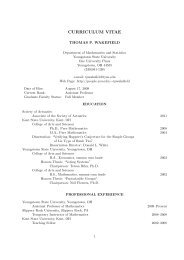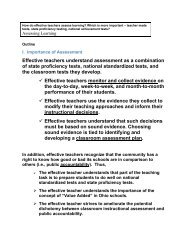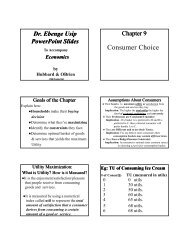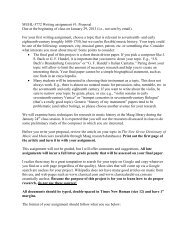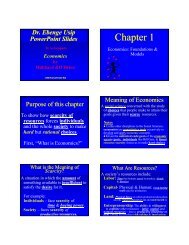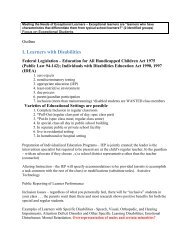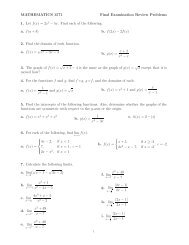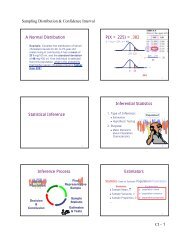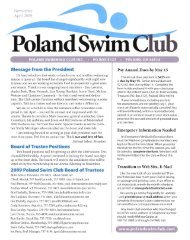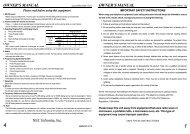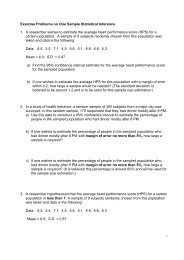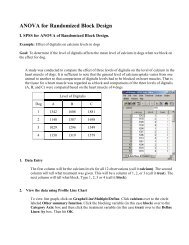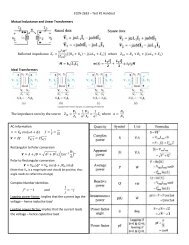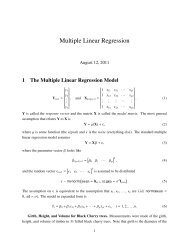Your Philosophy of Education
Your Philosophy of Education
Your Philosophy of Education
- No tags were found...
You also want an ePaper? Increase the reach of your titles
YUMPU automatically turns print PDFs into web optimized ePapers that Google loves.
TOWARD DISCOVERING MY PHILOSOPHY OF EDUCATIONEach person has a philosophy <strong>of</strong> education, a set <strong>of</strong> fundamental beliefs regarding what students needs,how teachers should teach, and how schools should run. To help you discover yours, read each <strong>of</strong> thefollowing statements and decide whether you agree or disagree with each statement. Use the followingnumbers to express your degree <strong>of</strong> agreement:5 Agree Strongly4 Agree3 Neutral or Undecided2 Disagree1 Disagree Strongly______1. Teachers should prepare more lessons that teach students through hands-on activities and focusless the teacher presenting or reading material to students. Students learn concepts best by engaging inproblem solving activities rather than reading about them.______2. The classroom is teacher-centered. The teacher as a pr<strong>of</strong>essional is far more likely to know whatstudents will need to know in the future than do they. S/he is responsible for the education and intellectualgrowth <strong>of</strong> his/her students.______3. While communities and cultures have outward differences, human nature remains the sameeverywhere; hence, the school’s curriculum should be the same for everyone.______4. Science, health, and economics should be learned through experiences outside the classroom inprojects involving the solving <strong>of</strong> real problems (such as pollution, overpopulation and hunger) that affectthe global community.______5. The teaching role is not one <strong>of</strong> guiding students to uncover a pre-existing reality; rather, teachersare involved in an interactive process <strong>of</strong> knowledge creation, i.e. teachers help students develop a workingunderstanding <strong>of</strong> reality and life.______6. In order for students to be successful in the world outside the classroom, the classroom shouldencourage cooperation among students rather than competition between students.______7. Content knowledge mastery can be assessed efficiently and effectively by a combination <strong>of</strong>classroom teacher-made tests and standardized tests created by pr<strong>of</strong>essional testing services.______8. Schools should teach children how to use their rationality (the human race’s highest attribute) todirect their instinctual nature (humankind’s lowest attribute).______9. <strong>Education</strong> must commit itself here and now to the creation <strong>of</strong> a new democratic social order thatwill fulfill the basic values <strong>of</strong> our culture and at the same time harmonize with the underlying social andeconomic forces <strong>of</strong> the modern world._____10. The interaction between the teacher and students is <strong>of</strong>ten best seen as a dialogue or conversationin which there is mutual influence rather than simple transmission from one to the other._____11. The curriculum <strong>of</strong> a school should be built around the personal experiences, developmentallevels, and learning skill needs <strong>of</strong> the students._____12. Discipline in the classroom is essential to learning. A noisy classroom is not a desirable place forlearning to take place. Order is vital. Self-discipline is fine, but most <strong>of</strong> the times it is insufficient._____13. It is education's task to bring knowledge <strong>of</strong> eternal truth into the minds <strong>of</strong> students. <strong>Education</strong>should focus on the discussion <strong>of</strong> timeless questions such as “What is beauty?” or “What is truth?”_____14. Children are shaped much more by their environment than by their genetic dispositions or theirfree will. Teachers should frequently reward students for good behavior and achievement to direct theirleaning to constructive ends._____15. There is no central tradition <strong>of</strong> knowledge (for example, one that is Eurocentric, Christian, orpredominantly male) that is more important than other knowledge tradition (for example, Native American,Islamic or predominantly feminist)._____16. Composition, music, and art classes or lessons for students should focus primarily on individualexpression and creativity._____17. The core <strong>of</strong> the crucial knowledge that most students need to learn is mostly derived fromscientific and technical fields; for example the Scientific Method with its emphasis on data gathering andhypothesis building is key learning technique.
_____18. <strong>Education</strong> must focus on character development (engaging in morally relevant conduct or words,or refraining from certain conduct or words)._____19. The means and ends <strong>of</strong> education must be completely re-fashioned to meet the demands <strong>of</strong> thepresent social and cultural crisis; students must be equipped with the attitude and skills necessary to createa better society than their ancestors did._____20. Teachers should help students understand how ideas and institutions are tailored to suit people’svalues and interests: for example, how television programming promotes life-styles that benefit commercialenterprises._____21. The gap between the real world and the world <strong>of</strong> the classroom can be bridged effectivelythrough the use <strong>of</strong> frequent films, guest speakers, field trips, internships, and the like._____22. Schools should endow students with a firm grasp and appreciation <strong>of</strong> traditional Americanhistory and values so that students will later function as good citizens._____23. Schools should develop students’ abilities to think deeply and analytically; this is moreimportant than developing their social skills or providing them with hands-on knowledge._____24. The teaching <strong>of</strong> American history should be to evoke discussion and serve as a basis for lookingto future democratic reforms, not a subject matter to be transmitted or memorized from textbooks (sincethese texts are filled with biases and prejudices)._____25. Schools must think in terms <strong>of</strong> teachers and students learning together. This is necessary both sothat the values and interests <strong>of</strong> students are taken into account, and so that the wealth <strong>of</strong> their everydayexperience is made available to fellow students and to the teacher._____26. Since students learn key perceptions about people and their values through social interaction, theideal classroom would be made up <strong>of</strong> a variety <strong>of</strong> students representing different ethnic, cultural, andreligious backgrounds._____27. Students should not be promoted from one grade to the next until they have read and masteredthe key material. Providing greater educational opportunities for lower achieving students have loweredstandards in the schools._____28. Students must be taught to appreciate learning primarily for its own sake rather than because itwill help them in their careers._____29. Schools are the basic social institution that can help create a new, more equal American societythat is genuinely democratic and a society whose major institutions and resources are used for the benefit <strong>of</strong>the people themselves._____30. The central role <strong>of</strong> the school is to provide students with options and choices. Students mustultimately decide on their own what and how to learn._____31. Teaching a child is analogous to cultivation <strong>of</strong> a beautiful flower; if you provide the child withthe appropriate nurturing environment, s/he will grow to be a healthy adult._____32. <strong>Education</strong> requires the mastery <strong>of</strong> content, <strong>of</strong> subject matter. Thus, while other factors may beimportant, an effective teacher must above all know his/her content._____33. Teacher-guided discussion leading to the unearthing <strong>of</strong> pr<strong>of</strong>ound truths (e.g. the SocraticMethod) is the key method <strong>of</strong> teaching students._____34. Through his/her own demonstrated personal commitment and role modeling, the teacher mustconvince her/his pupils <strong>of</strong> the validity and urgency <strong>of</strong> reform._____35. Effective teachers help students to discover and develop their personal values, even when thosepersonal values conflict with traditional ones <strong>of</strong> family and community._____36. With the decline <strong>of</strong> the family, community life, and small businesses, young people are losingvaluable opportunities to learn the knack <strong>of</strong> democratic participation. Schools need to make up for this lossand provide opportunities for social experiences and student-run activities._____37. The United States must become more competitive economically with other countries in theworld; therefore schools have a responsibility to bolster their academic requirements in order to help thecountry compete more effectively._____38. The teacher's main goal is to acquaint students with the insights learned over time (e.g. the greatworks <strong>of</strong> literature, philosophy) so they can gain wisdom from the great thinkers <strong>of</strong> the past._____39. In order to better the world for future generations, the school curriculum should focus most <strong>of</strong> itsattention on the urgent contemporary issues facing the modern generation._____40. Because a student may see a question differently, it is unhelpful and inhibiting for a teacher totell the student s/he is wrong. It disregards that the fact that the student is correct from her/his viewpoint.


